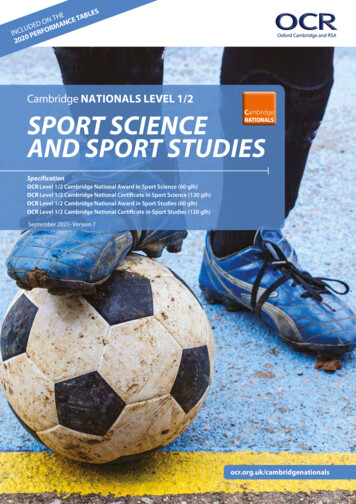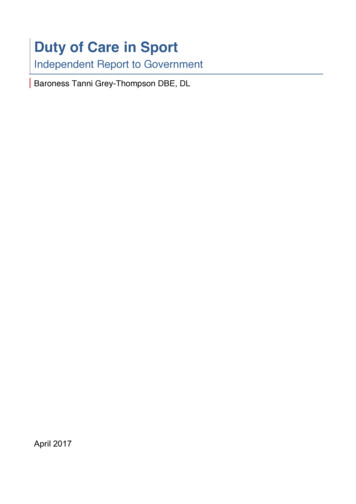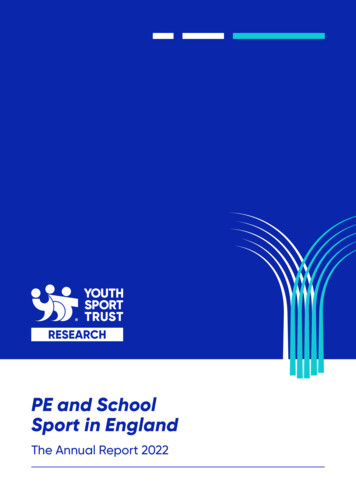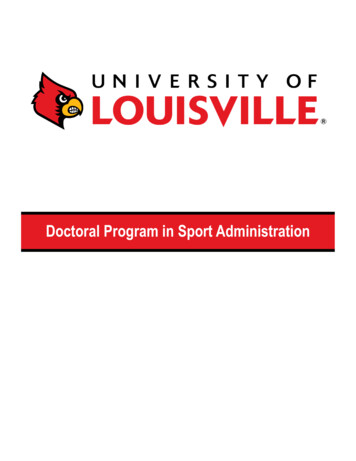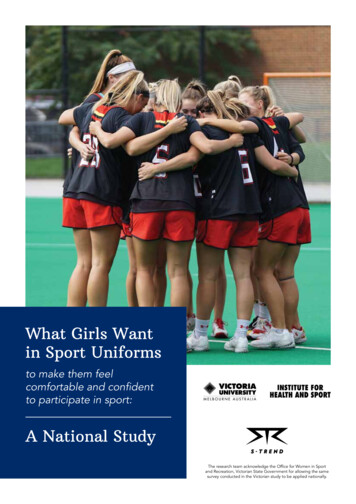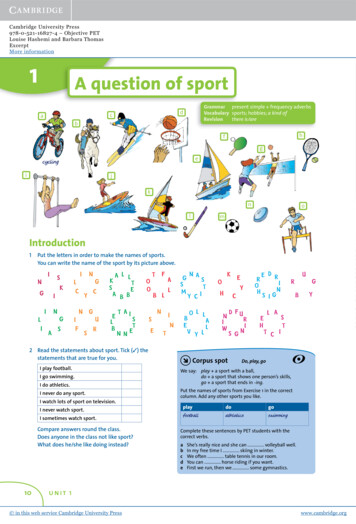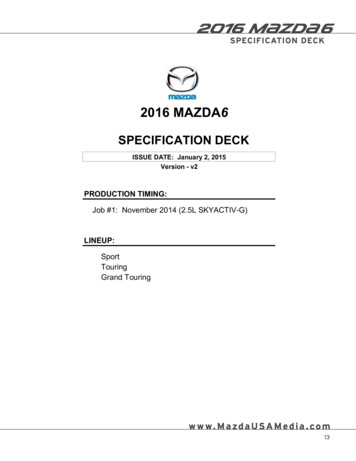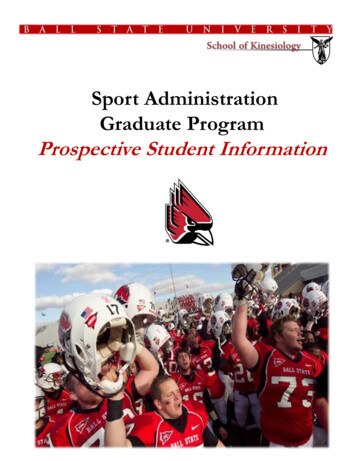
Transcription
Sport AdministrationGraduate ProgramProspective Student Information
Welcome to Ball State University! The School ofKinesiology invites you to explore the SportAdministration graduate program. Ball State students arecurrently filling jobs in the areas of sport marketing, sales,development, operations, management, and other roles allover the country. Come see what you can achieve!2
Prospective Student,Thank you for your interest in our sport administration graduate program, andcongratulations on your decision to further your education. The School ofKinesiology offers both a Master of Science (M.S.) and a Master of Arts (M.A.) inSport Administration.The sport administration program is designed to prepare graduates for a careerworking in sport at any level. Our comprehensive curriculum allows students topursue both an applied and theoretical approach to sport. If your goal is to work insport, or continue your education beyond a master's degree, our program can makeit happen. On the next several pages you will find the application and admissionprocess, as well as information about our program, our university, and graduateassistantships. Additional information is available online at our program website,or through Facebook (Ball State University Sport Administration Program) andTwitter (BallStSportAd).Sincerely,Dr. James E. JohnsonAssociate Professor and Sport Administration Graduate CoordinatorTable of ContentsWelcome .3Meet the Faculty .4What our graduates say .5Applications & Admissions Process.6Curriculum . .7Frequently Asked Questions .8-12University Resources 13Muncie Attractions. .14Ball State Athletics . .153
Meet the Graduate FacultyJames Johnson, Ed.D.,Associate Professor, Graduate Program CoordinatorDr. Johnson earned a B.A. in Psychology at Franklin college in 1999, and a M.S. in SportPsychology from Ball State University in 2001. After two years working as a commodity trader inChicago, Dr. Johnson worked seven years within intercollegiate athletics as the AssistantCoordinator of Academic Support Services for Student-Athletes at Ball State University. In 2010,Dr. Johnson earned an Ed.D. from Ball State University specializing in adult, higher, andcommunity education with a concentration in sport studies. Dr. Johnson is now an associateprofessor and has served as the sport administration graduate program coordinator since2011. His research includes work in interscholastic, intercollegiate, and recreational sport.Elizabeth Wanless, Ed.D. - Assistant ProfessorDr. Wanless earned her B.S. in Philosophy at Bates College in Lewiston, Maine. After asuccessful career as a professional track and field athlete, she went on to earn her M.S. in SportAdministration and Ed.D. in Higher Education at Ball State University. Currently, Dr. Wanless isthe Sport Administration Undergraduate Coordinator and has authored publications,presentations, and grants in revenue generation and community sport opportunity.Khirey Walker, Ph.D. - Assistant ProfessorDr. Walker earned a B.S. in Business Administration with a concentration in Marketingat Elon University in 2011, and a M.S. in Sport Administration from Louisiana StateUniversity in 2012. In 2017, Dr. Walker earned a Ph.D. from Louisiana State Universityspecializing in Kinesiology with a concentration in Sport Management. Dr. Walkercompleted his Dissertation on the organizational misconduct within intercollegiateathletics, specifically the National Collegiate Athletic Association. After graduatingfrom LSU, Dr. Walker has arrived at Ball State as an assistant professor. His researchincludes work in intercollegiate athletics, primarily involving rule governance,leadership studies, and student-athlete fulfillment.Mike Dalgety, Ed.D.- Assistant ProfessorDr. Dalgety earned a B.A. in Sport Sciences at University of the Pacific in 1997, and a M.A.in Information Resources and Library Science from the University of Arizona in 2003. Hehas 18 years of intercollegiate athletics experience, including roles as the Associate Directorof Athletic Media Relations, Director of Compliance, and Senior Associate Director ofAthletics for Internal Affairs at Pacific. In 2012, Dr. Dalgety earned an Ed.D. from Pacific,specializing in higher education. Dr. Dalgety is now a lecturer in sport administration andhas research interests in intercollegiate athletics.11
What our Graduates Say“The BSU Sport Administration graduate program prepared me for my job as an athletic director inmany ways. What I love most about the program is the relationship that the professors build with thestudents .The professors care about your success not only throughout your time as a student, butcontinue to provide guidance after graduation.”-Peyton Stovall (Class of 2010), Athletic Director, Lafayette Jefferson High School“The program at Ball State gave me valuable insights into what is going on andthe inter-workings of how an athletic department is run.”-Mark Naylor (Class of 2006), Assistant Strength Coach, University of Michigan“I had the opportunity to not only learn about the sport industry with relevant and applicable projects inthe classroom, but within the Athletics Department by volunteering.”-Chelsie Krill (Class of 2014), Partnership Activation Coordinator, Indiana Pacers“Professors care about your success notonly throughout your time as student, butcontinue to provide guidance aftergraduation.”“The graduate assistantship that I was able to obtain at Ball State launched my professional career in thesports industry. It was a great opportunity that gave me hands on work experience as a sportsinformation director, while also allowing me to continue my education with a master’s degree.”-Kit Stetzel (Class of 2008), Assistant Sports Information Director, Butler University“BSU’s Sport Administration graduate program offers courses that provide team-oriented projects. Byworking as a team, it challenged me to improve my organization and communication skills. Today, theseskills serve as the foundation of my management and leadership style.”-Derreck Parkevich (Class of 2011), CEO/Executive Director, Cass County Family YMCA“I truly loved having all my classes with the same people. Most of us are still friends and it is a greatresource to have because our field is always changing.”-Lauren Easter (Class of 2013), Assistant Director, Campus Recreation, Missouri State University5
Application and Admission ProcessApplication Deadlines:To start courses in summer or fall - all application materials must be submitted by February 15.To start coursework in the spring - all application materials must be submitted by November 1.To apply for a graduate assistantship in the School of Kinesiology (SOK), students should checkthe box on the school applications (step #2 below) which are due by February 15 or November 1.Note 1: Sport Administration graduate assistants within SOK must be available on campus for the entire durationof fall and spring semesters to fulfill their responsibilities as a graduate assistant.Note 2: Other graduate assistant positions on the Ball State campus will have varying deadlines. Students shouldcontact specific departments for deadlines.Application Process:Step #1: Apply for admission to the Ball State University Graduate School*. This will requirecompletion of the graduate school application, submission of all undergraduate transcripts, and a 60 application fee. Students should also request their GRE scores be sent to Ball State UniversityCode 1051. Please do NOT include a department code. More specific information can be foundat: Graduate School Application Information. In the Graduate School application process, you willbe required to submit the names and email addresses for 3 references.Step #2: Apply for admission to SOK (you do not have to wait for a response from the graduateschool before applying to SOK). The application can be found at: SOK Graduate ProgramApplication. As part of the SOK application process students should also submit the followingdocuments: A statement of purpose outlining your career goals (900-1000 words) A current resumeThese documents should be sent electronically to Amy Vold (Graduate Programs AdministrativeCoordinator) at avold@bsu.edu.*Before applying, international students should contact the Rinker Center for InternationalPrograms.Admission Process:If cleared by the graduate school, SOK application materials will be reviewed soon after eachapplication deadline. Only complete application files will be reviewed. Incomplete applications willbe kept for two years. Admission decisions will be based on available openings within the programand quality of application materials.6
CurriculumM.A. / M.S. – Physical Education and Sport – Sport Administration ConcentrationInternship or Paper/Project option (Master of Arts): 33 hours – Thesis option (Master of Science): 33 hoursAll courses are 3 credit hours except internship (6) and thesis (6)Core ClassesElective Course List(12 credit hours)Directed Electives (preferred)Core classes are required and only offered in semester listed.SPTA 611: Sport Marketing and Promotions (fall)SPTA 615: Sport Law (fall)SPTA 617: Financial Principles in Sport (spring)SPTA 676: Sport Administration Theory and PolicyDevelopment (spring)Research Requirements(9 credit hours MA – 12 credit hours MS)The internship or research paper options will fulfill requirements for theMA, while the thesis option will fulfill requirements for the MS. Studentsmust choose one of these options.Internship Option (9 hours) – MAPEP 601: Research Applications (non-thesis)SPTA 698: Internship in Sport Administration (6 hours)Paper/Project Option (9 hours) – MAPEP 601: Research Applications (non-thesis)EDPS 641: Introduction to Statistical MethodsRES 697: Research Paper (3 hours)OrCRPR: Creative Project (3 hours)Thesis Option (12 hours) – MSEXSC 611: Research Design and Data AnalysisEDPS 641: Introduction to Statistical MethodsTHES 698: Thesis (6 hours)Electives(9 credit hours MS – 12 credit hours MA)Students should choose electives based on interests, career goals,and availability. Students are encouraged to select SPTA directedelectives when available, but additional courses in related areas maybe approved by the graduate program coordinator.SPTA 603: Sport Administration Ethics and PhilosophySPTA 605: Organization and Administration of RecreationProgramsSPTA 619: Sport Facility and Event AdministrationSPTA 620: Seminar in Sport AdministrationSPTA 628: International and Comparative Administrationof SportSPTA 677: Intercollegiate Athletics PolicySPTA 691: Historical Foundations of SportAdditional Electives(not an exhaustive list)PEP 609: Sport PsychologyPEP 630: Evaluation in Physical EducationPEP 644: Psycho-Social Processes of Sport and PhysicalActivityPEP 690: Sport SociologyPEP 699: Independent StudyEDAD 600: Introduction to Educational LeadershipEDAD 630: Human Resource DevelopmentEDAD 640: The Educational Administrator and PublicRelationsEDAD 687: Legal Aspects of EducationEDAD 688: School Buildings, Grounds, and EquipmentEDAD 698: Seminar in Theory of EducationalAdministrationEDFO 631: Philosophy of EducationPR 660: Public Relations Theories and ApplicationPR 664: Public Relations Evaluation TechniquesACC 501: Financial AccountingECON 509: Survey of EconomicsMGT 500: Managing Organizational BehaviorMKG 505: Survey of MarketingNote: Athletic Coaching Education courses through the online Master’sin Athletic Coaching Education program may also be approved aselectives.7
Frequently Asked QuestionsAdmissions QuestionsHow are admission decisions made?After the application deadline, a committee ofgraduate faculty in the sport administration programevaluates all complete application files. Thecommittee reviews all materials assessing strengthsand weaknesses. Admission decisions are based onquality of application materials and available openingsin the program.What are the minimum GRE scoresaccepted for admission? There are no minimum GRE scores. GRE scores areused as one piece of information that is combinedwith all other application materials to create anapplicant’s admission file. GRE scores should be submitted to Ball StateUniversity, Code 1051. Please make sure that you doNOT include the Department code. When evaluating the GRE score, the selectioncommittee uses the percentile score more so than theraw score. The percentile score tells the committeehow well the applicant did on a particular section ofthe test relative to everyone that took the GRE. Forexample, if a student is in the 42nd percentile, it meanstheir score was higher than 42% of people that tookthe GRE. Therefore, the higher the score, the better. Typically, scores on all sections higher than the 50thpercentile would be desirable. Scores between the30th-50th percentile would be considered acceptable aslong as the other application materials were relativelystrong. Scores below the 30th percentile would beconsidered low and would require the rest of theapplicant file to be strong. These percentiles are roughguidelines and are relative to the number and qualityof applicants in addition to the available openings inthe program. The selection committee reserves theright to make subjective evaluations of all applicationmaterials. GMAT scores are acceptable in place of GRE scores.What is the minimum undergraduate GPAaccepted for admission? The minimum undergraduate GPA for admission tothe graduate school is 2.75. The same minimum isused for admission into the School of Kinesiology. GPA is used as one piece of information that iscombined with all other application materials tocreate an applicant’s admission file. Typically, GPAs above 3.3 are desirable. GPAsbetween 3.0 and 3.3 would be considered acceptableas long as other application materials are relativelystrong. GPAs below 3.0 would be considered lowand would require the rest of the application file tobe strong. These GPAs are rough guidelines and arerelative to the number and quality of applicants inaddition to the available openings in the program.The selection committee reserves the right to makesubjective evaluations of all application materials.8
Frequently Asked QuestionsAdmissions Questions (cont.)How many students normally apply, and howmany are normally admitted? For the February 15th application deadline (summer orfall enrollment) there are typically 40-60 applicants.Approximately 15-25 students are admitted. Thesenumbers vary annually. The number of studentsadmitted depends on the quality of applicants andnumber of available openings in the program. For the November 1st application deadline (springenrollment) there are typically 5-15 applicants.Approximately 3-10 applicants are admitted. Thesenumbers vary annually. The number of studentsadmitted depends on the quality of applicants andnumber of available openings in the program.If I have a degree other than sportmanagement/administration, can Istill apply to the program?Yes, students with any undergraduate degreecan apply. There are no prerequisites forstudents without a sport administrationdegree. However, students should attempt togain as much sport industry experience aspossible before applying.If I have a degree other than sportmanagement/administration will I bebehind other students?Students without a sport management/administration background willhave to adapt a bit faster, but concepts will be advanced for all students.There are several students currently in the program that haveundergraduate degrees other than sport management/administration.9
Frequently Asked QuestionsProgram QuestionsHow many students arein the program?At any given point there are 25-35 students inthe program. Numbers vary from year to yearbased on number of students admitted andretained.How long does it take to completethe program?The 33-hour program is designed to becompleted in a two-year period taking 6-9credit hours (2-3 courses) per semester(including summer). It is possible to finish theprogram in less than two years by taking 9-12credit hours (3-4 courses) per semester.When are classes usually held?During the semesters (fall and spring) each sportadministration course is typically held one day a week oncampus from 6:30-9:10pm. Occasionally, elective coursesare held at other times depending on a variety of factors.Are any of the courses online?Yes. During the summer, elective sport administrationcourses will be available online. These online courses aredesigned to accommodate students who are completinginternships, or are away from campus during the summer.Occasionally there are some online elective courses offeredduring the fall and spring semesters. Overall, studentsshould plan to take most of their courses on-campus duringthe fall and spring with online courses offered mostly duringthe summer.10
Frequently Asked QuestionsGraduate Assistant (GA) QuestionsWhat GA positions are available?Students in the sport administration program regularly receive GA positions in a variety of different areas on campus.Prospective students are encouraged to seek GA positions anywhere on campus. Most students with GA positions arelocated in SOK, Athletics, or Recreation. Check out the Graduate Assistantships page for more information. SOK – 3-4 GAs are assigned to faculty members in the sport administration program to assist with faculty researchand help teach physical fitness and wellness courses. There are 1-2 positions open each year. Athletics – A variety of administrative (e.g., compliance, marketing) and coaching GA positions exist in athletics.The sport administration program and SOK have nothing to do with the selection of these GA positions.Interested students should contact the athletic department directly to inquire about open positions. Recreation – A variety of recreation GA positions are open each year (fitness, marketing, facilities, intramurals,etc.). The sport administration program and SOK have nothing to do with the selection of these GA positions.Interested students should contact the Department of Recreation Services directly to inquire about open positions.What are the benefits of being agraduate assistant?GAs are expected to work 20 hours per weekfor their respective department in exchangefor tuition reimbursement, living stipend, andother perks. The amount of the stipend variesby department and funding cycle, but isusually enough to cover cost of living. GAsmust pay student fees each semester.Is there a separate applicationfor a GA position?No, there is not a separate GA application forSOK. When you complete the SOK application toenter the sport administration graduate programthere is a question that asks if you are interested ina GA position. If you check that box you will beconsidered for a GA position in SOK. If youdesire a GA position in another department (e.g.,athletics or recreation), you should contact thosedepartments directly to inquire about theirapplication process. Other GA positions oncampus can be found through the Cardinal CareerLink.11
Frequently Asked QuestionsGeneral QuestionsWhat are the job prospects for someonegraduating from this program?Most graduates immediately find jobs in the sportindustry, and many find full-time employment fromtheir internship organizations. Some students chooseto continue graduate school by enrolling in PhDprograms or other master’s programs. Employmentplacement rates are difficult to pinpoint, and vary fromyear to year, but it is safe to say a high majority ofgraduates are working in the sport industry aftergraduation.Does the program help identify professionaldevelopment opportunities?Yes, students are provided access to a variety ofprofessional development seminars, conferences, andworkshops. Additionally, the department subscribes tosport-specific job-posting websites regularly utilized tofind internships and jobs. Furthermore, during thespring of the first year a professional developmentsection is included within the sport administrationcourse, and focuses on finding internships and jobs inconjunction with resume development and interviewingskills. Finally, faculty members are available to assist inall areas of professional development.How do I set up a visit?To set up a visit, please contact Amy Vold. Amy is theadministrative coordinator for graduate programs withinSOK. Amy will customize a visit based on yourinterests. Amy’s email is avold@bsu.edu. Her phonenumber is 765-285-4453.12
University ResourcesCareer Center: Get help with interview skills, assistance in your job search, and network with employers.Benny Link: Choose from over 400 student organizations to get involved on campus.Writing Center: Drop by for some feedback on writing assignments or schedule a tutoring session.Recreation Services: Get fit in the state of the art fitness center or sign up for intramural sports.Dining: With 14 locations across campus, a good meal is only a short trip away.University Libraries: Access a massive collection of print & digital media, as well as academic journals.Multicultural Center: Appreciate and promote cultural diversity.Health Center: Visit the walk-in clinic or get a prescription filled at the pharmacy.Financial Aid & Scholarships: Apply for aid, manage loans, or search for scholarships.Event Calendar: Keep up with all entertainment and academic events around campus.13
Muncie AttractionsThe Village features housing, restaurants, and bars.Enjoy Minnetrista’s scenic gardens and unique museums.Walk, run, or bike Cardinal Greenway’s 62 mile trail.Check out downtown Muncie’s charming shops and restaurants.Treat yourself to Concannon’s award winning bakery.Visit nearby Indianapolis or Fort Wayne.14
GO CARDINALS!Ball State AthleticsWomen’s Varsity SportsMen’s Varsity Sports-Baseball-Basketball-Football-Golf-Swimming & Diving-Tennis-Volleyball-Basketball-Cross Country-Field Hockey-Golf-Gymnastics-Soccer-Softball-Swimming & Diving-Tennis-Track & Field-VolleyballDid you know? Ball State has 18 NCAA Division Iathletic teams Worthen Arena has a capacity of 11,500spectators, the 2nd largest arena in the MAC Several sport administration graduate studentshold graduate assistantships or volunteerpositions within athletics15
at Elon University in 2011, and a M.S. in Sport Administration from Louisiana State University in 2012. In 2017, Dr. Walker earned a Ph.D. from Louisiana State University specializing in Kinesiology with a concentration in Sport Management. Dr. Walker completed his Dissertation on the organizational misconduct within intercollegiate
